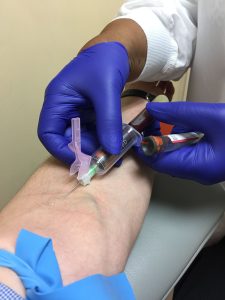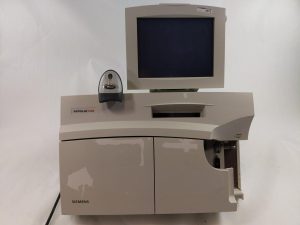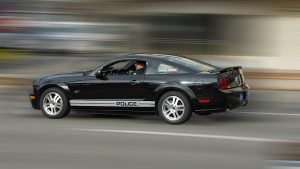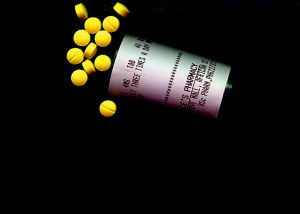Hospital Blood in Texas DWI Cases (Part 2)
 However, Texas allows the admissibility of medical laboratory blood that is drawn and tested at hospitals using indirect enzyme tests to be admissible in a driving while intoxicated case. This is despite the fact that the testing is a much less reliable enzyme test through a chemical reaction that is not testing only ethanol quantitatively or forensically. Normally, only blood plasma is tested, not whole blood, even though the driving while intoxicated statute says whole blood. Thus, a conversion formula is used even though each person’s plasma ratio is different.
However, Texas allows the admissibility of medical laboratory blood that is drawn and tested at hospitals using indirect enzyme tests to be admissible in a driving while intoxicated case. This is despite the fact that the testing is a much less reliable enzyme test through a chemical reaction that is not testing only ethanol quantitatively or forensically. Normally, only blood plasma is tested, not whole blood, even though the driving while intoxicated statute says whole blood. Thus, a conversion formula is used even though each person’s plasma ratio is different.
Hospital blood testing is for medical purposes and is generated to give medical providers a quick snapshot of the patient’s blood for medical treatment purposes. The machines are typically calibrated every six months or so, unlike a gas chromatograph which is calibrated every day. They may run quality control checks, but this is not calibration. Hospital blood testing normally cannot tell the difference between ethanol and isopropanol that is used to clean a blood draw site, and cannot tell the difference between ethanol and acetone and other chemicals, including chemicals in IV bags.
Hospitals also normally only run one test a day, rather than two tests on the same sample that the Department of Public Safety runs on a gas chromatography machine. These tests have up to a 25% error rate, which means that close cases should not normally be filed and should certainly be litigated if so. Also, these machines are not required to run a forensic test curve of five points like a gas chromatograph machine, which is the minimum for a forensically reliable sample. Additionally, we often do not get computer generated printouts of how the machine came to the calculation it did, another check on forensic quality. Finally, a hospital blood test does not have internal standards, which a Department of Public Safety test uses to test that the machine is actually reading ethanol alone. Without these internal standards, we do not know what the actual ethanol level in the plasma sample actually is.
 Sherman & Plano, TX Criminal Defense Lawyer Blog
Sherman & Plano, TX Criminal Defense Lawyer Blog


 I saw a Nick Saban quote online that addresses that there are few choices in life when we want to succeed. There are not many ways to do things the right way, usually only one way works. Coach Saban said “[w]e have a younger generation that isn’t told no or told exactly how to do it. As a consequence, many young people have this illusion they can do what they want. The fact of the matter is that if you want to be good, you really don’t have a lot of choices. It takes what it takes. You have to do what you have to do to be successful.”
I saw a Nick Saban quote online that addresses that there are few choices in life when we want to succeed. There are not many ways to do things the right way, usually only one way works. Coach Saban said “[w]e have a younger generation that isn’t told no or told exactly how to do it. As a consequence, many young people have this illusion they can do what they want. The fact of the matter is that if you want to be good, you really don’t have a lot of choices. It takes what it takes. You have to do what you have to do to be successful.” These policies have changed the dynamics of DWI defense in Grayson and Collin County. When I started practicing, around half of DWI trials did not involve a chemical test, but now almost all of them do. Back then we would mainly argue over the performance and validity of the field sobriety testing, which we still do, and the way a person looks on video. But, the addition of chemical test evidence means that you now more than ever need a highly trained DWI lawyer like myself who has been thoroughly trained on all aspects of DWI defense. There are more technical issues in a driving while intoxicated prosecution than most other cases, including most homicides.
These policies have changed the dynamics of DWI defense in Grayson and Collin County. When I started practicing, around half of DWI trials did not involve a chemical test, but now almost all of them do. Back then we would mainly argue over the performance and validity of the field sobriety testing, which we still do, and the way a person looks on video. But, the addition of chemical test evidence means that you now more than ever need a highly trained DWI lawyer like myself who has been thoroughly trained on all aspects of DWI defense. There are more technical issues in a driving while intoxicated prosecution than most other cases, including most homicides. While on this point, people often ask whether they should take a chemical test when arrested for driving while intoxicated. Our general response as defense attorneys is NO, because there are a lot of things that can go wrong with chemical testing. Both breath testing and blood testing are inexact sciences, and there are lots of human and mechanical errors that can happen to give you a much different result than your actual blood alcohol content. The test is also completely in the hands of the State, and officers and the laboratory employees can tamper with or mishandle the evidence. Also, if your blood alcohol content is above the legal DWI limit of .08, you are only producing evidence against yourself.
While on this point, people often ask whether they should take a chemical test when arrested for driving while intoxicated. Our general response as defense attorneys is NO, because there are a lot of things that can go wrong with chemical testing. Both breath testing and blood testing are inexact sciences, and there are lots of human and mechanical errors that can happen to give you a much different result than your actual blood alcohol content. The test is also completely in the hands of the State, and officers and the laboratory employees can tamper with or mishandle the evidence. Also, if your blood alcohol content is above the legal DWI limit of .08, you are only producing evidence against yourself. However, this is not the case with a Grayson or Collin County, Texas DWI. Grayson County has a policy of no alternative charges for DWI, and I have never seen themgive a public intoxication or an obstruction of highway/passageway on a local driving while intoxicated charge. Theywould rather let a jury decide your fate than do this, which is why it is very important to hire a real DWI trial lawyer immediately if you have been arrested. The only way your case is going to “go away” without a finding of guilt on a DWI is for it to be dismissed, which is rare and is normally in the circumstances of a bad stop or arrest (brought up by a good suppression motion), or because your chemical blood alcohol test came out very well for you. Or, if you have prior military service and are admitted and complete Veterans court, you can obtain a pretrial diversion. Pretrial diversion is similar to probation but contractual, and only upon completion of the contract terms will your case be dismissed.
However, this is not the case with a Grayson or Collin County, Texas DWI. Grayson County has a policy of no alternative charges for DWI, and I have never seen themgive a public intoxication or an obstruction of highway/passageway on a local driving while intoxicated charge. Theywould rather let a jury decide your fate than do this, which is why it is very important to hire a real DWI trial lawyer immediately if you have been arrested. The only way your case is going to “go away” without a finding of guilt on a DWI is for it to be dismissed, which is rare and is normally in the circumstances of a bad stop or arrest (brought up by a good suppression motion), or because your chemical blood alcohol test came out very well for you. Or, if you have prior military service and are admitted and complete Veterans court, you can obtain a pretrial diversion. Pretrial diversion is similar to probation but contractual, and only upon completion of the contract terms will your case be dismissed. I haven’t written a DWI blog in a bit, so I think it is time to do an update. Grayson County, Texas are particularly strict jurisdictions when it comes to driving while intoxicated, but there are still ways to have a better case and a better result in your case. Grayson and Collin County District Attorneys run on a platform of strict DWI enforcement, and the counties are very Republican. So, they pays particular importance to DWI cases. But since I began practicing in 2005, I have seen some small shifts (and improvements) in the ways that driving while intoxicated is enforced in these and neighboring counties.
I haven’t written a DWI blog in a bit, so I think it is time to do an update. Grayson County, Texas are particularly strict jurisdictions when it comes to driving while intoxicated, but there are still ways to have a better case and a better result in your case. Grayson and Collin County District Attorneys run on a platform of strict DWI enforcement, and the counties are very Republican. So, they pays particular importance to DWI cases. But since I began practicing in 2005, I have seen some small shifts (and improvements) in the ways that driving while intoxicated is enforced in these and neighboring counties. The age old question about whether to consent to a DWI breath or blood test is still the question many people who socially drink and fear a DWI investigation want answered, particularly now that they read in the news that cops will forcefully draw their blood if they refuse. The answer in most situations is still “NO”, for several reasons.
The age old question about whether to consent to a DWI breath or blood test is still the question many people who socially drink and fear a DWI investigation want answered, particularly now that they read in the news that cops will forcefully draw their blood if they refuse. The answer in most situations is still “NO”, for several reasons. Not to be outdone by the wisdom of the Oklahoma Legislature, our braniacs in Austin last year enacted “aggravated” driving while intoxicated provisions similar to the Sooner state, whereby a first time offender now faces a year in jail if the person 1) commits the offense of driving while intoxicated, and 2) “If it is shown on the trial of an offense under this section that an analysis of a specimen of the person’s blood, breath, or urine showed an alcohol concentration level of 0.15 or more at the time the analysis was performed.” The offense is enhanced from a Class B to a Class A misdemeanor.
Not to be outdone by the wisdom of the Oklahoma Legislature, our braniacs in Austin last year enacted “aggravated” driving while intoxicated provisions similar to the Sooner state, whereby a first time offender now faces a year in jail if the person 1) commits the offense of driving while intoxicated, and 2) “If it is shown on the trial of an offense under this section that an analysis of a specimen of the person’s blood, breath, or urine showed an alcohol concentration level of 0.15 or more at the time the analysis was performed.” The offense is enhanced from a Class B to a Class A misdemeanor. America is a pill culture. Every day a large percentage of our population drives the highways of Texas under the care of prescription medication that can possibly effect their mental or physical abilities. Key word: possibly. Each individual is in the best position to use their judgment as to when they should or should not drive, but you should exercise caution when driving on prescription medication, because it can lead to a DWI arrest. If an officer believes that you have lost the normal use of your physical or mental faculties because of a certain drug, you can be arrested. This includes your own medication. Drugs such as “narcotics” and “painkillers” and “antidepressants/psychotropics” are ones that will get the closest look. And, most officers are not trained extensively on testing for the side effects of these drugs like they are trained to test for alcohol impairment.
America is a pill culture. Every day a large percentage of our population drives the highways of Texas under the care of prescription medication that can possibly effect their mental or physical abilities. Key word: possibly. Each individual is in the best position to use their judgment as to when they should or should not drive, but you should exercise caution when driving on prescription medication, because it can lead to a DWI arrest. If an officer believes that you have lost the normal use of your physical or mental faculties because of a certain drug, you can be arrested. This includes your own medication. Drugs such as “narcotics” and “painkillers” and “antidepressants/psychotropics” are ones that will get the closest look. And, most officers are not trained extensively on testing for the side effects of these drugs like they are trained to test for alcohol impairment. I recently had the pleasure (and challenge) of representing a particular client that was charged with DWI 3rd or more in Fannin County. The case was unique because the client consented to a blood draw, and in client’s blood was half the legal limit of alcohol (.04), a narcotic analgesic (painkiller) and a central nervous system depressant (muscle relaxer). The State’s theory was “synergistic effect of the drugs,” i.e. that the combination of the drugs caused intoxication. The police officer testified to arresting client for failure to complete the field sobriety test to officer’s satisfaction, plus admission of alcohol and painkillers. However, the officer could not recognize the field sobriety manual for lack of being provided one at training. Also, the officer was also not trained on drug recognition, an additional training course for DWI detection due to drugs or a combination of drugs and alcohol.
I recently had the pleasure (and challenge) of representing a particular client that was charged with DWI 3rd or more in Fannin County. The case was unique because the client consented to a blood draw, and in client’s blood was half the legal limit of alcohol (.04), a narcotic analgesic (painkiller) and a central nervous system depressant (muscle relaxer). The State’s theory was “synergistic effect of the drugs,” i.e. that the combination of the drugs caused intoxication. The police officer testified to arresting client for failure to complete the field sobriety test to officer’s satisfaction, plus admission of alcohol and painkillers. However, the officer could not recognize the field sobriety manual for lack of being provided one at training. Also, the officer was also not trained on drug recognition, an additional training course for DWI detection due to drugs or a combination of drugs and alcohol.